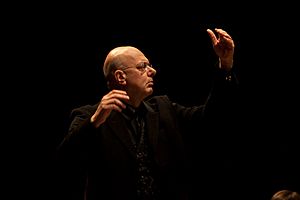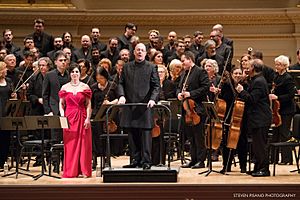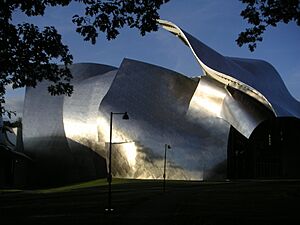Leon Botstein facts for kids
Quick facts for kids
Leon Botstein
|
|
|---|---|
 |
|
| President of Bard College | |
| Assumed office 1975 |
|
| Preceded by | Reamer Kline |
| Personal details | |
| Born | December 14, 1946 (age 79) Zürich, Switzerland |
| Spouse | Barbara Haskell |
| Children | 4 |
| Relatives | David Botstein (brother) |
| Education | University of Chicago (BA) Harvard University (MA, PhD) |
| Occupation | Scholar, Conductor, Educator |
| Signature | |
Leon Botstein (born December 14, 1946) is a Swiss-born American who is famous for his work as a conductor, educator, and scholar. He is best known for being the president of Bard College since 1975. He is also a music director and conductor for several orchestras.
Contents
Early Life and Education
Leon Botstein was born in Zürich, Switzerland, in 1946. His parents were Polish-Jewish doctors who had escaped from Europe during World War II. When Leon was two years old, his family moved to New York City.
From a young age, Leon was passionate about music. He learned to play the violin with the famous teacher Roman Totenberg. In 1963, he graduated from the High School of Music and Art in Manhattan at just 16 years old.
He then went to the University of Chicago, where he studied history and graduated in 1967. While in college, he was the lead violinist and assistant conductor of the university orchestra. He even started his own chamber orchestra. After Chicago, he attended Harvard University to study history, focusing on the music of Vienna.
A Young College President
In 1970, when he was only 23 years old, Botstein became the president of Franconia College in New Hampshire. This made him the youngest college president in American history.
Five years later, in 1975, he became the president of Bard College in New York, a position he still holds today. Under his leadership, Bard College has grown tremendously. More students have enrolled, the campus has expanded, and many new programs have been created.
A Return to Music
After a personal family tragedy, Botstein decided to focus again on his musical career. In 1985, he earned his Ph.D. in music history from Harvard University. He began training as a conductor and soon started leading the Hudson Valley Philharmonic Chamber Orchestra.
Leading Orchestras and Festivals
In 1990, Botstein started the Bard Music Festival. This popular festival led to the building of the Richard B. Fisher Center for the Performing Arts, a beautiful performance hall designed by the famous architect Frank Gehry.
In 1992, Botstein became the music director of the American Symphony Orchestra. He is known for performing works by lesser-known composers, bringing their music to new audiences.
In 2003, he also became the music director of the Jerusalem Symphony Orchestra. He led the orchestra on tours across the United States and Europe. He is now the orchestra's Conductor Laureate, a special title given to honor his work.

Creating Educational Programs
Botstein has worked to create educational opportunities around the world. He helped start liberal arts programs in Eastern Europe, Central Asia, and the Middle East. He also helped found Bard College Berlin in Germany.
At Bard, he started several important programs:
- The Bard Prison Initiative (BPI) began in 1999. It offers college education to people in prison. The program was featured in a 2019 documentary called College Behind Bars.
- The Bard College Conservatory of Music opened in 2005. It provides top-level music training to students.
- The Orchestra Now was founded in 2015. It is a special orchestra that helps young musicians prepare for professional careers.
Musical Style and Scholarship
Botstein is known for his creative concert programs. Instead of just playing famous pieces, he often builds concerts around a theme, like a historical event or an art movement. This helps the audience understand the music in a new way.
He also gives lectures during his concerts, where he explains the music and answers questions from the audience. This series is called "Classics Declassified."
As a scholar, Botstein has written many books and articles about the history of music and its connection to culture and politics. He has been the editor of the important music journal The Musical Quarterly since 1993.
Personal Life
Botstein's brother, David Botstein, is a famous biologist. His parents were both doctors.
He is married to Barbara Haskell, an art historian. They have two children, Clara and Max. He also has a daughter, Sarah, from his first marriage. Sarah Botstein is a documentary film producer.
Awards and Honors
Botstein has received many awards for his work in music and education.
| Title | Year |
|---|---|
| Honorary Doctor of Science, Watson School of Biological Sciences, Cold Spring Harbor Laboratory | 2018 |
| Honorary Doctor of Humane Letters, Goucher College | 2017 |
| Honorary Doctor of Music, Sewanee: The University of the South | 2016 |
| Lifetime Achievement Award - YIVO Institute for Jewish Research | 2015 |
| The Deborah W. Meier Hero in Education Award - Fairtest | 2015 |
| Caroline P. and Charles W. Ireland Distinguished Visiting Scholar Prize - University of Alabama at Birmingham | 2014 |
| Jewish Cultural Achievement Award - The Foundation for Jewish Culture | 2013 |
| Kilenyi Medal of Honor - The Bruckner Society of America | 2013 |
| The University of Chicago Alumni Medal | 2012 |
| Leonard Bernstein Award for the Elevation of Music in Society | 2012 |
| Elected to the American Philosophical Society | 2010 |
| Carnegie Academic Leadership Award - The Carnegie Corporation | 2009 |
| Grammy Award nomination for Best Orchestral Performance | 2006 |
| Award for Distinguished Service to the Arts from the American Academy of Arts and Letters | 2003 |
| Austrian Cross of Honor for Science and Art | 2001 |
| Harvard Centennial Medal | 1996 |
| National Arts Club Gold Medal | 1995 |
Selected Recordings
- (2020) Erich Wolfgang Korngold, Frederic Chopin, and Nikolai Rimsky-Korsakov. The Orchestra Now.
- (2016) George Gershwin. Gershwin: Rhapsody in Blue, Piano Concerto in F. Royal Philharmonic Orchestra.
- (2015) Paul Hindemith. The Long Christmas Dinner. American Symphony Orchestra.
- (2008) Béla Bartók. Concerto for Orchestra. London Philharmonic Orchestra.
- (2007) Paul Dukas. Ariane et Barbe-Bleue. BBC Symphony Orchestra.
- (2005) Ernest Chausson. Le roi Arthus. BBC Symphony Orchestra.
- (2004) Gavril Popov: Symphony No. 1. London Symphonic Orchestra. Nominated for a Grammy Award.
- (2003) Richard Strauss. Die Ägyptische Helena. American Symphony Orchestra with Deborah Voigt.
- (2000) Richard Strauss. Die Liebe der Danae. American Symphony Orchestra.
 | DeHart Hubbard |
 | Wilma Rudolph |
 | Jesse Owens |
 | Jackie Joyner-Kersee |
 | Major Taylor |


